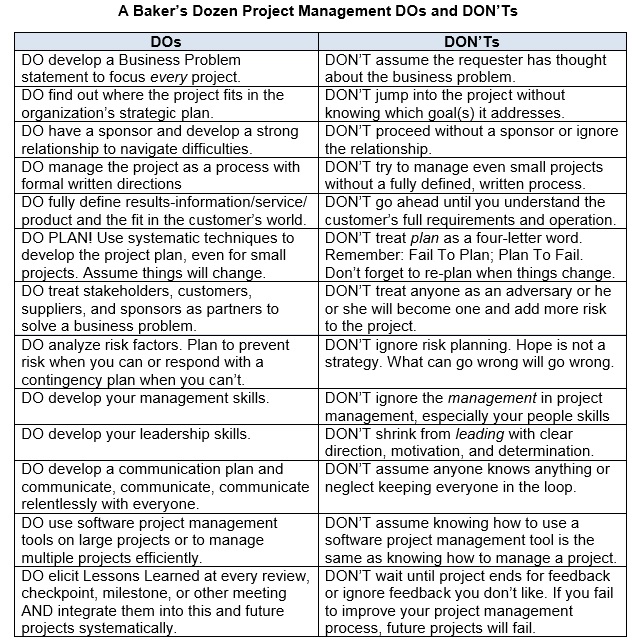December 27, 2016
Being a Project Manager is not for the faint of heart. If you don’t enjoy nearly impossible challenges, lots of criticism, the ground constantly shifting under your feet, and contradictory demands from powerful people, consider another way to make a living.
When downsizing/re-sizing/right-sizing became the norm, companies eliminated whole departments of folks who took care of all sorts of important work. The work still needed doing and outsourcing/off-shoring/on-shoring/in-sourcing didn’t always work.
What to do? Turn everything into a project! Assign someone to be in charge and call the person a project manager. It didn’t matter what the person’s position on the org chart was or whether he or she had any training or experience; just assign the project.
Needless to say, lots of projects took a nose dive. Even with all the information available today, sophisticated project management tools, and organizations, conferences, and books dedicated to project management, many projects and project mangers still fail.
It doesn’t have to be that way. We just have to use the knowledge that’s out there.
What is a project anyway? The late Joseph Juran, a founder of the modern quality movement, provided a great definition. A project is a problem scheduled for solution. What’s a problem? A gap between what we have and what we want or need.
Over the years we’ve discovered some basic, critical DOs and DON’Ts to focus on while using established project management processes, techniques, and tools.
|
|
Whether your project is producing the annual department meeting, building a stretch of the Interstate, or creating software for the next Mars rover, the fundamental rules of good project management always apply. Ignore them at your peril. Of all the project management DOs and DON’Ts, the most important are: (1) Fully define the business problem to focus your planning, (2) Manage, lead, and communicate extraordinarily, and (3) Learn from everything you do and plow it back into your next project. Keep closing the gap on your own project management performance.
So who killed project management? We did. And we continue to do so every time we choose not to BE great project managers.
©Rebecca Staton-Reinstein, Ph.D., president of Advantage Leadership, Inc., has managed projects in medical research, genetics, information technology, education, process improvement, organizational development, and other fields. She works with companies around the world who are ready to improve their project management to get better results and integrate these practices into their strategic leadership, planning, and development initiatives to improve efficiency and effectiveness.

